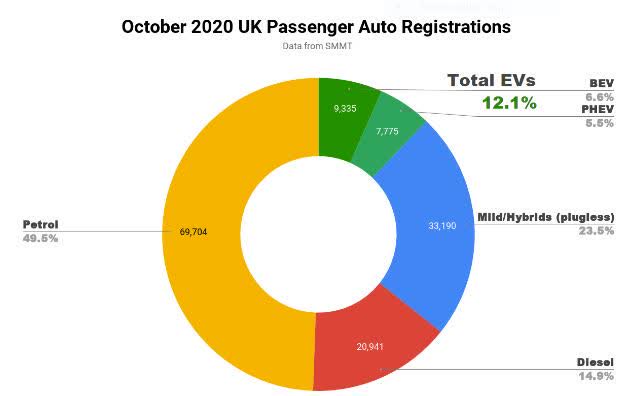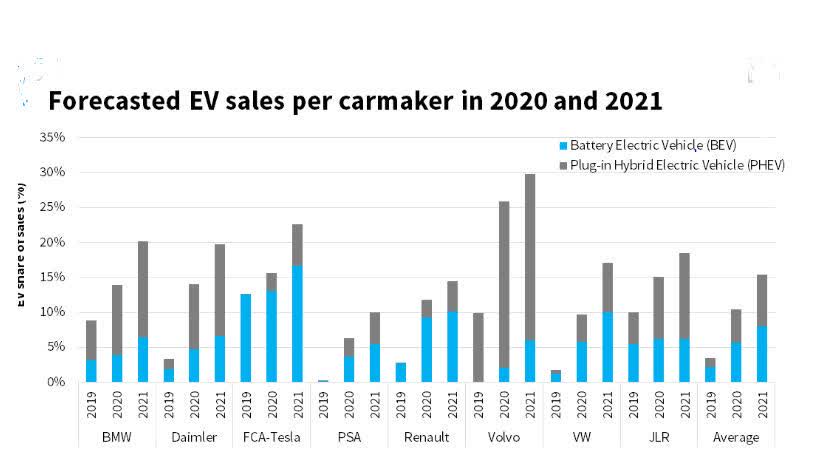Britain will ban the sale of new gasoline and diesel cars and vans beginning in 2030, as part of Prime Minister Boris Johnson’s “green revolution” to cut emissions to net zero by 2050. The 2030 date for the ban is five years earlier than the 2035 pledge made by Johnson in February. A ban on the sale of hybrid cars and vans will be 5 years later—in 2035.
The plan is to cost 12 billion pounds ($16 billion) of government money and as much as three times that amount from the private sector, and create and support 250,000 jobs by 2030, according to projections used by Johnson. Prime Minister Johnson, however, is not divulging that there will be an overall decline in jobs because it takes less time to build an electric car than a conventional gasoline or diesel car due to its fewer components. Electric cars can be built with a fraction of the moving parts, which makes them cheaper to maintain. An electric car’s battery and motor have only 200 components, compared with at least 1,400 parts found in a combustion engine and transmission.
Britain first placed a ban on sales of new internal-combustion cars by 2040. Because the 2040 deadline was criticized by Greens as not aggressive enough, it was upped to 2035 earlier this year before settling at the 2030 date more recently. The 2030 date gives the country only 10 years to get the charging infrastructure in place to handle the influx of electric cars. Part of the 12 billion pounds will be spent on infrastructure and 582 million pounds ($774 million) of it will be given out in grants to reduce the cost of buying zero or ultra-low emission vehicles for the public.
U.K. Auto Registrations
In October, Britain’s auto registrations for gasoline and diesel cars totaled 90,645—a 64.4 percent share and the plug-in electric vehicle registrations totaled 17,110—a record 12.1 percent share. The 12.1 percent was composed of full battery electric vehicles (BEVs) at 6.6 percent and plug-in hybrids (PHEVs) at 5.5 percent. The remainder (23.5 percent) were hybrids that were plug-less. (See chart below.)

European Sales
Several other European countries—including France, the Netherlands, and Norway—have considered bans on internal-combustion cars. Because of favorable subsidies and benefits, sales of low and no-emissions cars have increased tremendously in Norway. For example, automotive taxes for gasoline and diesel cars are high in Norway, making electric vehicles, which are not taxed, appealing.
Stricter European Union emissions standards that took effect earlier this year have led to increased electric vehicle production. Electric vehicles are expected to make up 10 percent of auto sales in Europe by the end of 2020 and reach 15 percent in 2021. (See chart below.)

Biden’s Campaign Position on Electric Vehicles
While Joe Biden has not committed to a ban on gasoline and diesel vehicles for the United States, his commitment to “net zero emissions by 2050” would make their use and ownership very difficult. He has also stated his position on electric vehicles and charging stations. According to his website, he will “make major public investments in automobile infrastructure — including in 500,000 electric vehicle charging stations—to create good jobs in industries supporting vehicle electrification. These investments are a key part of Biden’s commitment to reinvent the American transportation system from the factory line to the electric vehicle charging station…”.
However, that position is not good enough for the Zero Emission Transportation Association, a coalition of electric vehicle manufacturers, utilities and mineral companies, who are pressing for the United States to reach 100 percent electric vehicle sales by 2030. Members of the group include Tesla Inc., which has dominated the electric vehicle market, and Lordstown Motor Corporation who is building an all-electric pickup truck that is planned to be available in the fall of 2021. The association is advocating for two main policies: a consumer incentive and investments in charging infrastructure.
During his campaign, Biden indicated that he would restore and reform the electric vehicle tax credit to make it more appealing to middle-class consumers. Currently, the federal electric vehicle tax credit allows consumers to receive a tax reduction of up to $7,500 on taxes they owe. The credit expires once a manufacturer has sold 200,000 eligible vehicles, which both Tesla and GM have done.
Note that such a ban would mean the end to the U.S. ethanol industry as well as to most of the nation’s oil industry, putting millions of Americans out of work. It would mean Americans would have to settle for a more expensive vehicle with less of the features that are important to them. It would directly benefit China, which dominates the electric vehicle battery market, and the coalition, who want higher electric vehicle and electricity sales mandated via government policies.
Conclusion
There are many issues associated with electric vehicles that consumers do not like including cost, safety, availability of charging stations, driving range, and truck capacity to name just a few. Some European countries are banning gasoline and diesel vehicles to meet their net zero carbon emissions mandates by 2050. But switching the transportation sector to all electric vehicles by 2030 as Britain purports it is doing and as the Zero Emission Transportation Association wants would be a tremendous cost to Americans, who would need to purchase the electric vehicles, and taxpayers, who would provide the funds for incentives and charging stations. Many of the benefits would go to China, where most of the batteries and/or materials to make them come from. The companies in the coalition are not looking for what is best for the American people, but rather, are trying to get politicians to mandate that consumers buy their vehicles and taxpayers subsidize them.



